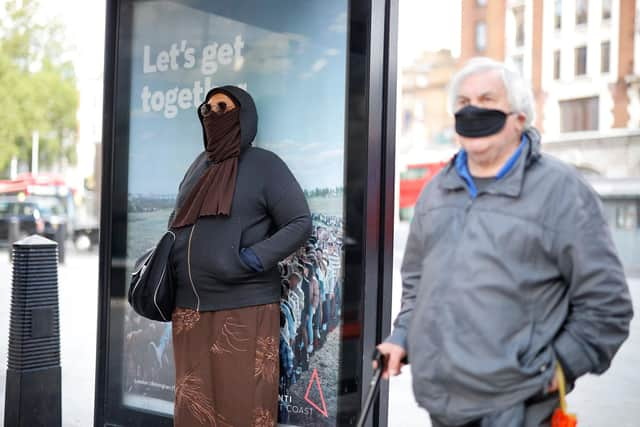Wear a mask where possible and stand side-by-side: New advice on staying safe outside
and live on Freeview channel 276
They have also been told to stand side-by-side rather than face-to-face when meeting other people from outside their household, and to stay at least two metres apart whenever possible.
Only a vaccine or drugs can control coronavirus, Government briefing warns, as more details around lockdown released
The advice was issued in the latest government update issued this afternoon, Monday, May 11, on how to stay safe outside as the lockdown restrictions are eased.


Advertisement
Hide AdAdvertisement
Hide AdOther measures people can take include washing clothes frequently, as the virus can survive on fabric, and using hand sanitiser when outside their home.
Employers have been advised to take steps to protect their staff, including staggering start and finish times to reduce crowding at entrances and exits.
Here’s the full lowdown on how people are now being advised to stay safe and prevent the spread of COVID-19.
Keep your distance
People are still being advised to keep two metres apart as a precaution but the Government says the key thing is not to be too close to people for more than a short people of time. It says the risk of infection increases the closer you are to someone with the virus and the longer you spend near them but you are unlikely to be infected just walking past
Keep your hands and face as clean as possible
Advertisement
Hide AdAdvertisement
Hide AdPeople should continue to wash their hands often using soap and water, and to dry them throughly, and they should avoid touching their face.
Where available, they are also advised to use sanitiser outside their home, especially when entering a building or after having had contact with any surface.
Work from home if possible
The Government says employers should support people to find reasonable adjustments to work from home where possible. But if your workplace is open and you cannot work from home, you can travel to work.
Avoid being face-to-face with people from outside your household
You are at higher risk of being directly exposed to respiratory droplets (released by talking or coughing) when you are within two metres of someone and have face-to-face contact with them. You can lower the risk of infection if you stay side-to-side rather than facing someone.
Reduce the number of people you spend time with in a work setting
Advertisement
Hide AdAdvertisement
Hide AdThe Government says employers should be able to support people, where practical, to reduce the number of people they come into contact regularly by, for example, changing shift patterns and rotas to match you with the same team each time or splitting people into smaller, contained teams.
Avoid crowds
People are advised to reduce the number of people they come into close contact with by, for example, avoiding using public transport at peak times if possible. Businesses can also take steps like allowing the use of more entrances and exits and staggering entry and exit.
Think about how you travel, if you need to
Anyone who has to travel for work or to school is advised to walk or cycle where possible and to avoid peak times if using public transport. Employers should consider staggering working hours, expanding bicycle storage areas and providing changing facilities or extra car parking spaces.
Wash your clothes regularly
There is evidence the virus can survive on fabrics for a few days, though it is usually shorter, so if you are working with people outside your household you should wash your clothes regularly.
Advertisement
Hide AdAdvertisement
Hide AdChanging clothes in workplaces should only be considered where there is a high risk of infection or there are highly vulnerable people, such as in a care home.
Keep indoor places well ventilated
Evidence suggests that leaving windows and doors open in areas where people from difference households come into contact can help reduce transmission
Businesses should use external extractor fans to keep spaces well ventilated and make sure that ventilation systems are set to maximise the air flow rate.
Heating and cooling systems can be used at their normal temperature settings.
Face masks
Advertisement
Hide AdAdvertisement
Hide AdPeople are advised to wear a face covering when in an enclosed space where social distancing isn’t possible or they will come into contact with people they don’t usually meet, like on public transport or in some shops.
This will not protect the wearer but could prevent them from spreading the disease if they are already infected but not yet showing any symptoms.
Face coverings do not prevent the need for social distancing, and anyone with symptoms of COVID-19 should still self-isolate.
Surgical masks and respirators should continue to be reserved for healthcare staff and other key workers who need them most, but people can make simple face coverings at home, ensuring they cover the mouth and nose.
Advertisement
Hide AdAdvertisement
Hide AdIt is important to use masks properly and wash your hands before putting them on and taking them off.
Some countries have made face masks mandatory on public transport and in supermarkets, but this is not yet the case in the UK.
Follow your employer’s advice
The Government has issued guidance for employers, who have a duty to assess and manage risks to your safety in the workplace, and employees have been told to follow the advice from their employers.
The advice for employers includes making adjustments to help maintain social distancing and ensuring frequent cleaning, especially of surfaces which get a lot of use like door handles, lift buttons, bathorroms and kitchens.